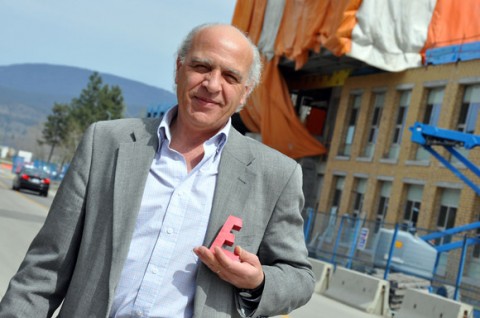

Standing near the construction site of the future home of Engineering at UBC's Okanagan campus, Spiro Yannacopoulos, Associate Dean and Director of the School of Engineering, holds a small version of the "E" that has become an icon of this rapidly growing school.
UBC Okanagan’s School of Engineering has undergone rapid growth and change since it opened just five years ago. This June, an important milestone will be reached with the graduation of the School’s first cohort of students, who began their studies in 2005.
“The ultimate goal of the School of Engineering is to graduate people who will make a difference in the world,” says Spiro Yannacopoulos, Associate Dean and Director of the School of Engineering. “As a school, we will measure our success by the success of our graduates.”
And thanks in part to a very dedicated and diverse group of faculty, staff and industry professionals, Yannacopoulos is confident graduating students have the tools they need to contribute to the engineering profession and the world.
“We hire faculty and staff who are extremely dedicated — they pay personal attention to students. We have small classes, so our professors are familiar with individual students,” he says. “We have put together a very innovative curriculum, and our professors are excellent researchers who keep up with the latest advancements in engineering science.
“Faculty members engage students in their research, which means undergraduate students have the opportunity to see the applications of the engineering principles they are taught in the classroom.”
The program also has built very close ties with the engineering industry. In fact, the School of Engineering was established, in part, through the efforts of people in the local industry. This year, fourth-year engineering students worked on projects submitted directly by industry through a mandatory Capstone Design Project course.
“Building strong relationships with the university is critical for our industry,” says Dick Fletcher, a professional engineer and principal with Urban Systems Ltd. “We are strongly committed to supporting the development of engineering graduates. Their knowledge and skills will ultimately benefit the engineering profession and contribute to our ability to provide the services required to develop a sustainable society in a global economy.”
Undergraduate student numbers have exploded since the School’s inception in 2005, increasing from 76 students in the first year to 482 students studying toward their Bachelor of Applied Science degrees in Civil, Electrical or Mechanical Engineering. Today, the School has 36 master’s students and 34 PhD students, and the graduate program has received hundreds of applications from all over the world this year alone.
“We have students from the Valley, the Lower Mainland, other parts of Canada and other parts of the world,” says Yannacopoulos. “We have a good mix in terms of gender and backgrounds. I would call the atmosphere truly international. We have faculty representing 14 different countries, so they each bring different expertise. We want to educate engineers to be able to work at the international level.”
To accommodate the ever-expanding group of students, faculty and staff, a brand-new $68-million building will soon become home to the School of Engineering, the Faculty of Management and the Faculty of Education.
“The new building is going to make a huge difference in the development of the School,” says Yannacopoulos. “Our students will have a place to call home, hold their meetings and advance their student activities, while our professors will have access to world-class facilities to perform their research and instruct undergraduate labs.”
Major research funding agencies — the Natural Sciences and Engineering Research Council and the Canada Foundation for Innovation — are paying attention to what’s happening at the School of Engineering. Research grants for engineering this year reached more than $4.8 million, up from $40,440 in research grants back in 2005.
Being part of UBC’s Faculty of Applied Science and receiving strong support from Okanagan campus administration has helped the School of Engineering quickly build its reputation at home and far afield.
“We have evolved into a program that is garnering a reputation for excellence across the globe,” says Yannacopoulos. “We have worked very hard to create a first-rate program with an international scope that focuses on things like team work, research opportunities, design, technology, and industry experience.”
— 30 —